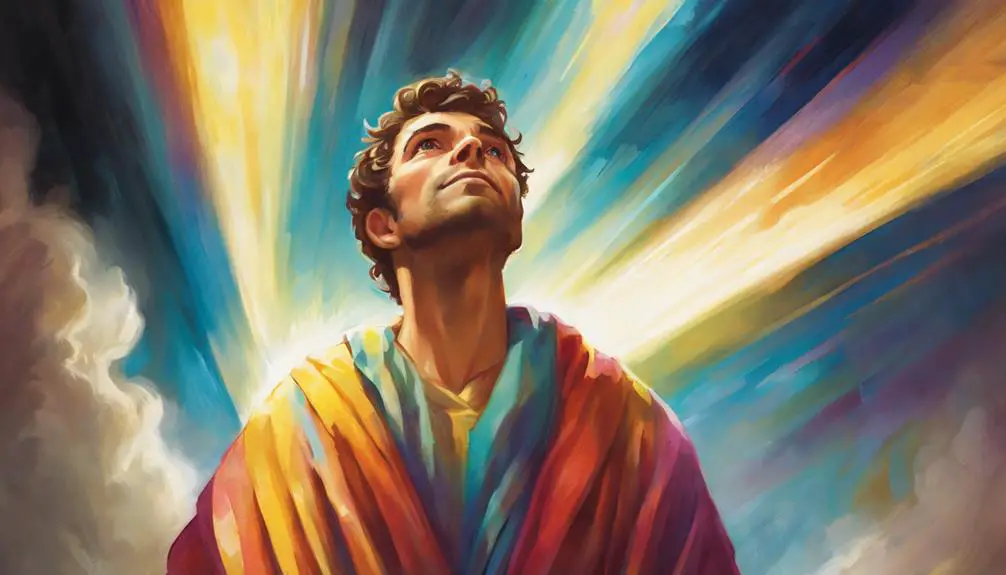Peer into the lives of biblical figures who placed profound trust in God, uncovering lessons of faith that resonate through the ages.

People Who Trusted God in the Bible
Throughout time, tales of trust have transcended the texts of the Bible, bringing to life lessons of loyalty and faith. You'll find yourself fascinated by figures such as Noah, who navigated the unknown with unwavering faith, and Abraham, whose obedience was outstanding. There's also Joseph, whose resilience in the face of adversity was remarkable, Esther, who exhibited extraordinary courage, and Daniel, whose trust was truly unshakable.
Each story serves as a compelling testament to the power of faith. Yet, what can you learn from their experiences that might illuminate your own path? This question hangs in the air, inviting you to explore further.
Key Takeaways
- Trust in God often requires courage, as shown by Esther and Daniel facing life-threatening challenges.
- Obedience to God, like Noah and Abraham, signifies deep faith and trust in His plans.
- Resilience in adversity, demonstrated by Joseph, highlights unwavering belief in God's guidance.
- Divine guidance leads to deliverance, illustrated by stories of Noah, Esther, and Daniel.
Noah's Unwavering Faith

In the face of overwhelming challenges, Noah's unwavering faith in God stands as a testament to the power of steadfast belief and obedience. When you consider the divine warning Noah received, it's not just about the impending flood; it's about the trust and faith he placed in God's words. The Ark construction wasn't a small feat; it was a monumental task that required not just physical labor but a profound sense of spiritual dedication. Noah didn't waiver, even when the task seemed insurmountable or when others doubted him.
You've got to understand, the divine warning wasn't merely an advisory; it was a test of faith. Noah's response—his immediate action to build the Ark—demonstrates a level of trust in God that's both rare and admirable. It wasn't blind faith, but a conscious choice to trust in God's plan, despite having no tangible proof of the impending disaster. This act of obedience wasn't just about survival; it was a declaration of faith, a belief that following God's command was the right path, regardless of how absurd it might've seemed at the time.
Noah's story teaches you the importance of listening to and trusting in divine guidance, no matter the circumstances.
Abraham's Obedience
Just as Noah's story exemplifies unwavering faith, Abraham's obedience to God's commands presents another profound lesson in trust and commitment. You'll find in Abraham's narrative, a journey marked by sacrificial readiness and a promised journey that required absolute faith.
Abraham's willingness to leave his homeland on a promise from God showcases a level of trust that's both inspiring and daunting. This act alone sets a precedent for what it means to follow God's guidance, even when the end is not in sight. But it's perhaps his readiness to sacrifice his son, Isaac, at God's command that starkly embodies the depth of his faith. This moment, while troubling, illustrates a commitment to God that transcends personal desire or understanding.
Aspect |
Detail |
Significance |
|---|---|---|
Sacrificial readiness |
Willing to sacrifice Isaac |
Demonstrates profound trust in God |
Promised journey |
Left homeland for an unknown land |
Embodies faith in God's promises |
Commitment |
Followed God's commands without fail |
Shows depth of trust and obedience |
Faith's reward |
Blessed with countless descendants |
Affirms that trust in God is rewarded |
In analyzing Abraham's obedience, you're invited to reflect on the magnitude of trust and commitment required to follow God's will, even when it challenges your deepest fears and desires.
Joseph's Resilience

Joseph's story teaches us resilience through adversity, demonstrating how unwavering faith in God can guide us through even the darkest times. His journey from the pit to the palace is a testament to the power of trust and perseverance. Betrayed by his brothers and sold into slavery, Joseph faced unimaginable trials. Yet, he didn't waver in his faith.
In Egypt, Joseph's talent for dream interpretation, a divine gift, became his beacon of hope. Despite being wrongly imprisoned, he used this skill to earn the Pharaoh's trust, interpreting dreams that foretold of famine. This pivotal moment not only showcased his resilience but also his unwavering belief in God's plan for him.
Joseph's ascent from the pit to becoming the Pharaoh's trusted advisor is nothing short of miraculous. It's a journey that underscores the importance of maintaining faith in God's timing. His story urges you to hold onto your faith, especially when faced with adversity. Through his resilience, Joseph teaches us that with God's guidance, any obstacle can be overcome, transforming trials into triumphs. His life is a powerful reminder that faith can lead us from the depths of despair to the heights of success.
Esther's Courage
Esther's story exemplifies unparalleled courage, showing us that faith can empower you to face formidable challenges head-on. Amidst royal intrigue and the threat of her people's annihilation, Esther, a queen hidden by her Jewish identity, steps into her role with remarkable bravery. Her story isn't just about personal courage; it's a testament to female leadership in a time when women's voices were often silenced.
Aspect |
Detail |
Impact |
|---|---|---|
Context |
Persian Empire |
A setting ripe with royal intrigue. |
Challenge |
Potential genocide |
Esther faced an unimaginable threat. |
Action |
Revealed her faith |
A bold step, defying expectations. |
Support |
Mordecai's counsel |
Guidance rooted in trust and wisdom. |
Outcome |
People saved |
Her faith and action led to deliverance. |
Esther's narrative encourages you to consider how faith can guide you through perilous times. Her willingness to risk it all, driven by a profound faith in God and a sense of duty towards her people, highlights the strength found in trusting something greater than oneself. In Esther's courage, we see the power of female leadership and the resilience required to navigate the complexities of royal intrigue.
Daniel's Trust

Similarly, the story of Daniel exemplifies another profound instance of trust in God, showcasing how unwavering faith can navigate us through life's lion's dens. In the depths of adversity, Daniel's trust wasn't passive; it was an active, living faith that confronted challenges head-on. When faced with the lions' den, a situation that seemed like certain death, Daniel's confidence in God's protection didn't waver. It's a vivid reminder that faith can indeed move mountains—or in Daniel's case, calm the fiercest beasts.
Furthermore, Daniel's ability to interpret dreams, a gift that set him apart in the royal court, was another testament to his trust in God. He didn't claim the glory for himself but consistently credited God for the wisdom and insight provided. This humility and acknowledgment of God's power in dream interpretations reinforced his trust, not just in moments of personal peril but also in navigating the complexities of life at the court.
Daniel's story teaches us that trust in God isn't merely about expecting miracles when we're in the lions' den; it's also about recognizing and attributing every aspect of our wisdom and success to His guidance and providence.
Frequently Asked Questions
How Did the Concept of Trust in God Evolve Throughout the Bible, From the Old Testament to the New Testament?
You'll see that trust in God evolved significantly from the Old Testament to the New Testament. Initially, it was grounded in the Abrahamic Covenant, where faith was demonstrated through obedience and sacrifice.
As time progressed, Prophetic Guidance shifted this trust towards a more personal and communal relationship with God, emphasizing moral integrity and social justice. This evolution reflects a deepening understanding of trust in God, moving from contractual to relational faithfulness.
Are There Instances Where Women in the Bible Demonstrated Trust in God Outside of Esther's Story, and How Were Their Contributions Unique?
Absolutely, you'll find instances like Rahab's courage in hiding the spies, showcasing her immense trust in a God she barely knew.
Then there's Mary's devotion, accepting her role as the mother of Jesus with faith that transcends understanding.
Each woman's trust was unique, reflecting personal journeys that intertwined with God's larger narrative.
Their stories highlight how trust in the divine isn't just about monumental faith; it's about personal, transformative relationships.
How Do Biblical Scholars Reconcile Stories of Trust in God With Instances of Doubt or Disbelief Among These Figures?
Navigating the sea of faith, you'll find biblical scholars often view doubt as a storm that tests the vessel of belief.
They reconcile these moments by highlighting that doubt doesn't negate trust but deepens it, showing a dynamic relationship with the divine.
In What Ways Have Modern Interpretations of These Biblical Stories Influenced Contemporary Faith Practices?
Modern interpretations of biblical stories have deeply impacted contemporary faith practices through cultural adaptations and digital evangelism. You'll find that churches now embrace diverse cultural expressions in worship, making faith more relatable.
Digital platforms are also used to spread teachings, engaging a global audience. This blend of tradition with modernity helps you connect with your faith in ways that are both personal and relevant, fostering a deeper understanding and commitment to spiritual growth.
Can the Principles of Trust Depicted in These Stories Be Applied to Interfaith Dialogues or Non-Religious Contexts for Moral and Ethical Learning?
Absolutely, the principles of trust can extend beyond religious narratives to foster interfaith empathy and highlight ethical universals. Just as stories captivate and teach, these timeless lessons serve as a bridge, encouraging dialogue and understanding across diverse beliefs.
They're not just about faith; they're about humanity, offering a common ground for moral and ethical reflection. This approach enriches our collective wisdom, guiding us toward a more empathetic and united world.
Conclusion
In reflecting on these biblical figures, it's evident that unwavering faith isn't just a relic of the past. A recent Pew Research Center study found that 67% of people worldwide still turn to prayer in times of need, mirroring the trust and resilience demonstrated by Noah, Abraham, Joseph, Esther, and Daniel.
Their stories aren't just historical accounts; they're living testimonies to the power of faith in guiding and sustaining us through life's challenges. Their legacy, deeply revered and analytically significant, continues to inspire millions today.



Sign up